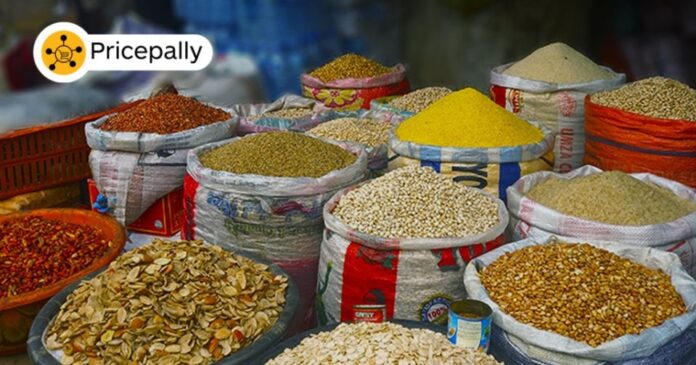Consumers resort to bulk buying amid food inflation
Consumers in Lagos State have embraced new strategies to reduce cost and put food on their tables amid food inflation in the country.
Some consumers told the News Agency of Nigeria (NAN) on Sunday in Lagos that they were exploring strategies, including bulk buying, to reduce their monthly budgets on food.
Bulk buying is the purchase of large quantities of a particular product or products, typically at a discount.
NAN reports that in September, Nigeria’s inflation rose to 32.70 per cent after slowing consecutively in July and August.
Food prices remain a key driver of inflation, with the food inflation rate climbing to 37.77 per cent in September 2024, a 7.13 per cent increase from the 30.64 per cent recorded in the same period in 2023.
The increase in food inflation is largely attributed to rising prices of staples such as rice, maize, beans and yam. Month-on-month, the food inflation rate also increased to 2.64 per cent in September 2024, up from 2.37 per cent in August.
Mrs Iyabo Adebayo, a mother of three and a civil servant, said she had embarked on bulk buying to reduce food cost and take care of her family better.
“Buying in bulk is the best option in this food inflation period, and it has helped me tremendously in ensuring that there is food always in my home.
“Some of the ways I go about the bulk buying is to contribute money along with friends and colleagues, and when the money is complete, we head to the market for bulk purchases and then share.
“Also, I go the extra mile of saving toward that. As a salary earner, I remove a portion from my salary and put aside, and when it is complete, I make my contribution and we head to market.
“This bulk purchase is the best way because it reduces the amount spent on foodstuffs in the market, as some of the goods bought are got at wholesale prices or discount,” Adebayo said.
She said that she recently bought beans, stockfish and cassava flakes (garri) in bulk, stressing that the prices were better compared with retail prices.
Adebayo told NAN that sometimes, she and her friends bought foodstuffs from outside Lagos State to enjoy some discounts.
“We bought honey beans from northern Nigeria at N8,250 per ‘paint bucket’. In Lagos markets, it up to N12,000,” Adebayo said.
For Mrs Nkeiruka Chinemeze, a mother of four, the increase in food prices has become worrisome.
“The hike in food prices has become worrisome; hence, one has to devise a means of managing to buy food items with available but inadequate fund.
“Due to food inflation, I had to resort to bulk buying as it enables one to buy more commodities at considerable amounts.
“Vividly, there is gain in bulk buying, as such enables one to buy the items cheaper than when buying in small quantities.
“I encourage fellow women to engage in bulk buying as it is cost-effective and saves one the stress of always going to the market,” Chinemeze said.
Mr James Osoka, a businessman, called on the Federal Government to intervene in the current food crisis in the country.
Osoka said that the government should find a way to control prices of food stuffs to reduce the suffering of the masses.
He commended the government for efforts so far to rebuild the economy as well as providing food palliatives to the citizens.
He said that the ongoing sale of 50kg bag of rice to civil servants at the cost of N40, 000 was commendable.
He, however, urged the government to do more to reduce prices of foodstuffs.
“I contribute money with some of my friends, and we buy foodstuffs in bulk from the North or East depending on the stable food.
“This reduces the cost and ensures that our children are not hungry,” he said.
A wholesaler, Mrs. Esther Umeileka, the Managing Director of Fresh2Home Ltd., Lagos, told NAN that she had been in commodities business since 2002.
“I ventured into the business to bridge the gap between producers and the end-users,” Umeileka said.
She told NAN that orders for bulk buying increased in recent times due to rising food prices.
“One advantage of bulk buying is that it helps to reduce the cost, you will have more value for your money in terms of quantity and quality.
“You will also have the advantage of buying fresh products. Bulk buying is not only for the rich, the not-too-rich or average person can also buy in bulk.
“They can reach out to a couple of people so they come together and make contributions toward buying in bulk and sharing in portions,” she said.
Umeileka, a graduate of Agronomy, urged Nigerians to cut down on unnecessary things in order to make ends meet.
“Learn to manage what is available. Also learn how to prepare home-made snacks and drinks,” she added.





















